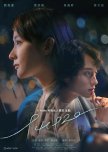Deze recentie kan spoilers bevatten
"Stories…are where memories go when they’re forgotten.”
(Quote is from Doctor Who.)
It's hard not to compare this drama with Leap Day, because I loved the prequel so much and I was expecting this drama to continue with the same tone and the thoughtful emphasis on character development more than plot progression.
In Leap Day, characters are preoccupied with time and what their future holds for them - Yeesa slowly owning her life and her decisions as she grapples with the fact that she might die in a few years time, Ryan pursuing both Yeesa and his dreams. Even supporting characters like Fiona and Yeesa's father make hard decisions in the present, so that they can continue living for the people they love, despite grieving the loss of someone important in their lives.
In 940920, the focus shifts to memories and how the characters' lives are affected by them. The constant search for missing memories drive the plot in an interesting manner - the mystery behind the death of Ka-Chung's mother and Yeesa having to live in a parallel universe with people who don't share her memories. Even from the first episode, the audience is introduced to Chau-Sok (Chor-Ying's grandfather), who has dementia and who most visibly portrayed the way the loss of memories can affect one's life. His growing despair and helplessness is heartbreakingly stark behind his smiles and happy moments with Chor-Ying as his condition takes away more and more of his consciousness. The plot arc revolving around him, slowly building in the first three episodes and culminating in the devastating scene in Episode 5, was written really well with appropriate pacing and a brilliant performance from both Yu Chi Ming and Jo Koo.
The shift in focus might be a little jarring to fans of Leap Day but I find that it plays off quite nicely to the prequel and the theme of fate / destiny. At the end, Chor-Ying's sacrifice provided the basis of better understanding the Ka-Chung we know and love in Leap Day, while cleverly showing how important she was to him. Even though all memories of her were erased in parallel universe A, the love Ka-Chung had for her was strong enough to make the other Ka-Chung in parallel universe B "remember" and turn them into a written story, a permanent record that can never be erased.
The idea of time-travelling through the polaroids is original and refreshing, even down to the small details of how the person time-travelling only has 15 minutes - around the same time taken for the image to develop completely on the polaroid. The CGI effect involved in that movement is pretty neat too, with no unnecessary flourishes to make the whole thing look gaudy. The workings of the time-travel remain mysterious, even till the end of the drama, and there was never an explanation for them. Why can the time-travel only be done on the night of the full moon? Why can it only be used by people who had a near-death experience? I don't mind the mystery but it feels like they didn't know what else to add and merely pulled elements from different superstitions or spiritual beliefs to make the whole thing "fuller"? A contrast to the simple explanation in Leap Day of how it was the amulet left by Yeesa's mother (as a powerful symbol of her love and protection) that gave Yeesa the ability to time-travel.
Another thing I do wish that was done better was Yuet. As a pivotal character who pushed the plot into its climax, he didn't feel like he was crafted with much thought. His back-story with Kami and his character motivations were too unbelievable. Or rather, I wish his character development weren't as rushed. There should have been more scenes explaining his emotional outbursts so that the audience wouldn't be thrown off by the things he did later in the drama.
All things considered, the plot is a lot more dynamic than Leap Day and the stakes for the characters are much higher this time round. The last few episodes were thrilling to watch and also satisfying when the storyline gradually resolves itself without much complications.
It's hard not to compare this drama with Leap Day, because I loved the prequel so much and I was expecting this drama to continue with the same tone and the thoughtful emphasis on character development more than plot progression.
In Leap Day, characters are preoccupied with time and what their future holds for them - Yeesa slowly owning her life and her decisions as she grapples with the fact that she might die in a few years time, Ryan pursuing both Yeesa and his dreams. Even supporting characters like Fiona and Yeesa's father make hard decisions in the present, so that they can continue living for the people they love, despite grieving the loss of someone important in their lives.
In 940920, the focus shifts to memories and how the characters' lives are affected by them. The constant search for missing memories drive the plot in an interesting manner - the mystery behind the death of Ka-Chung's mother and Yeesa having to live in a parallel universe with people who don't share her memories. Even from the first episode, the audience is introduced to Chau-Sok (Chor-Ying's grandfather), who has dementia and who most visibly portrayed the way the loss of memories can affect one's life. His growing despair and helplessness is heartbreakingly stark behind his smiles and happy moments with Chor-Ying as his condition takes away more and more of his consciousness. The plot arc revolving around him, slowly building in the first three episodes and culminating in the devastating scene in Episode 5, was written really well with appropriate pacing and a brilliant performance from both Yu Chi Ming and Jo Koo.
The shift in focus might be a little jarring to fans of Leap Day but I find that it plays off quite nicely to the prequel and the theme of fate / destiny. At the end, Chor-Ying's sacrifice provided the basis of better understanding the Ka-Chung we know and love in Leap Day, while cleverly showing how important she was to him. Even though all memories of her were erased in parallel universe A, the love Ka-Chung had for her was strong enough to make the other Ka-Chung in parallel universe B "remember" and turn them into a written story, a permanent record that can never be erased.
The idea of time-travelling through the polaroids is original and refreshing, even down to the small details of how the person time-travelling only has 15 minutes - around the same time taken for the image to develop completely on the polaroid. The CGI effect involved in that movement is pretty neat too, with no unnecessary flourishes to make the whole thing look gaudy. The workings of the time-travel remain mysterious, even till the end of the drama, and there was never an explanation for them. Why can the time-travel only be done on the night of the full moon? Why can it only be used by people who had a near-death experience? I don't mind the mystery but it feels like they didn't know what else to add and merely pulled elements from different superstitions or spiritual beliefs to make the whole thing "fuller"? A contrast to the simple explanation in Leap Day of how it was the amulet left by Yeesa's mother (as a powerful symbol of her love and protection) that gave Yeesa the ability to time-travel.
Another thing I do wish that was done better was Yuet. As a pivotal character who pushed the plot into its climax, he didn't feel like he was crafted with much thought. His back-story with Kami and his character motivations were too unbelievable. Or rather, I wish his character development weren't as rushed. There should have been more scenes explaining his emotional outbursts so that the audience wouldn't be thrown off by the things he did later in the drama.
All things considered, the plot is a lot more dynamic than Leap Day and the stakes for the characters are much higher this time round. The last few episodes were thrilling to watch and also satisfying when the storyline gradually resolves itself without much complications.
Vond je deze recentie nuttig?















